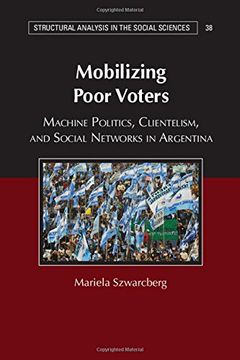Share
Mobilizing Poor Voters: Machine Politics, Clientelism, and Social Networks in Argentina (Structural Analysis in the Social Sciences, Series Number 38)
Mariela Szwarcberg (Author)
·
Cambridge Univ Pr
· Hardcover
Mobilizing Poor Voters: Machine Politics, Clientelism, and Social Networks in Argentina (Structural Analysis in the Social Sciences, Series Number 38) - Mariela Szwarcberg
Choose the list to add your product or create one New List
✓ Product added successfully to the Wishlist.
Go to My Wishlists
Origin: Spain
(Import costs included in the price)
It will be shipped from our warehouse between
Wednesday, June 12 and
Friday, June 21.
You will receive it anywhere in United Kingdom between 1 and 3 business days after shipment.
Synopsis "Mobilizing Poor Voters: Machine Politics, Clientelism, and Social Networks in Argentina (Structural Analysis in the Social Sciences, Series Number 38)"
Democracy has provided opportunities for political representation and accountability, but it has also created incentives for creating and maintaining clientelistic networks. Why has clientelism consolidated with the introduction of democracy? Drawing on network analysis, Mobilizing Poor Voters answers this question by describing and explaining the emergence, maintenance, and disappearance of political, partisan, and social networks in Argentina. Combining qualitative and quantitative data gathered during twenty-four months of field research in eight municipalities in Argentina, Mobilizing Poor Voters shows that when party leaders distribute political promotions to party candidates based only on the number of voters they mobilize, party leaders incentivize the use of clientelistic strategies among candidates competing to mobilize voters in poor neighborhoods. The logic of perverse incentives examined in this book explains why candidates who use clientelism succeed in getting elected and re-elected over time, contributing to the consolidation of political machines at the local level.

